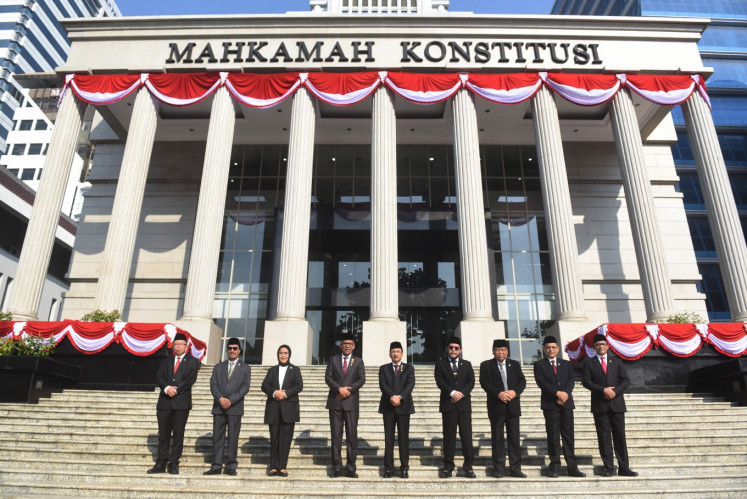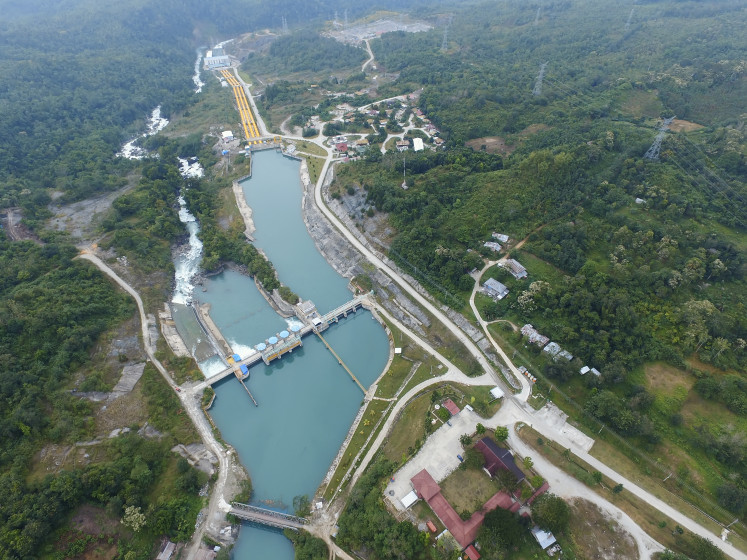Popular Reads
Top Results
Can't find what you're looking for?
View all search resultsPopular Reads
Top Results
Can't find what you're looking for?
View all search resultsIs there a future for the country’s defense industry?
Showing off shooters: An employee of state-owned weapons manufacturer PT Pindad shows off assault rifles produced by the company’s plant in Bandung, West Java
Change text size
Gift Premium Articles
to Anyone

S
span class="caption" style="width: 398px;">Showing off shooters: An employee of state-owned weapons manufacturer PT Pindad shows off assault rifles produced by the company’s plant in Bandung, West Java. Following the financial crisis, the company has run into financial problems, leading to a mass exodus of its employees. JP/Hasyim Widhiarto Three state-owned companies in the defense industry are running low on manpower as budget constraints have hampered their ability to hire new talent and develop new research.
With most of its company employees being older than 40, company executives at ship maker PT PAL Indonesia, weapons manufacturer PT Pindad and aircraft manufacturer PT Dirgantara Indonesia said they were concerned about their respective companies’ futures.
PT PAL’s director for human resources and general affairs Sewoko Kartanegara said the company now employed 1,400 workers, far lower than the 6,000 it had in the 1990s. Among the workforce only 80 staffers, who are senior engineers and possess the requisite knowledge and skills in design, develop and build various kinds of ships.
“The number of expert engineers is still sufficient to ensure the sustainability of our [ship] production line and maintenance services. But we can only rely on their services for a few more years, as the average age among them stands between 47 and 48 years old,” Sewoko said.
The retirement age at the company is 55 but the company’s management can extend employees’ tenure if they are promoted and join the company’s board of directors.
The firm, which derives most of its revenue from ship maintenance services, has also found it difficult to offer its employees competitive salaries.
“We did raise the salary of low- and middle-ranking workers on promotion. But the salary gap between them is growing closer as we have failed to raise the salaries among our higher-level workers over the past several years,” Sewoko said. The company now needs at least Rp 8 billion (US$896,000) to pay for employees’ salaries and benefits per month.
Operating on the verge of bankruptcy for more than a decade, Bandung-based aircraft maker Dirgantara has lost many of its key personnel.
Dirgantara’s technology and business development director, Dita Ardonni Jafri, said the company currently had fewer than 900 engineers and technicians, much lower than the 2,000 skilled workers during the 1990s.
“Should Dirgantara fail to secure any new aircraft development projects in the next two years, the company will potentially lose its ability to design and build aircraft, since our human resources will have no opportunity to catch up with the fast-changing, technological developments,” Dita said. The company has also been struggling with an aging workforce, with more than 70 percent of its 4,000 employees being over the age of 40.
For Pindad, the key problem is the high price of imported materials.
The exorbitant price of raw materials, including gunpowder and bullet casings, have sapped the company’s resources, which are needed to develop its human resources and improve its infrastructure.
The company recently announced that it needed Rp 696 billion to build, among other things, a testing ground for armored personnel carriers, as well as to refurbish its aging production facilities in order to increase the company’s annual production capacity from 20,000 to 30,000 assault rifles, 18 million to 32 million 9-mm bullets and 50 million to 113 million 5.56-mm bullets, by 2013.
The company also has an aging workforce problem. Pindad considers the average age of its 2,000-plus employees, which currently stands at 43, as a pressing problem.
For the first time in many years, the company advertised new positions in September this year.
“We expect to recruit between 50 and 70 newly graduated engineers,” said Pindad’s director for weapon-system products, Slamet Irianto.
In their heyday between the 1980s and 1990s, PAL, Dirgantara and Pindad received generous financial support from the government via the then research and technology minister and head of the Strategic Industry Regulatory Body (BPIS), Bacharuddin Jusuf Habibie, who was also a close aide to president Soeharto. Habibie’s huge investment in the companies bore fruit in the early 1990s, when the local companies designed and produced the CN-235 cargo plane and the N-250 passenger aircraft, warships and various high-quality rifles and a range of ammunition.
The companies’ fortunes plummeted in the period following the 1998 Asian financial crisis when the government, under pressure from the International Monetary Fund (IMF), cut its financial support to the companies.
The companies soon faced long-standing financial problems and management woes, which led to the departure of their top experts and engineers.
Without government support, PAL and Dirgantara have been beset by debt problems for more than a decade, while Pindad, although still in the black, has been operating on a shoestring budget.
After more than a decade of mismanagement, the government, through state-asset management company PT Perusahaan Pengelola Aset (PPA), has recently introduced a restructuring program, by offering the ailing companies capital injections from the state budget and loan conversions. The target is simple: The companies must become primary suppliers of the Indonesian Military’s (TNI) primary weapons’ defense system by 2024.









